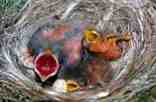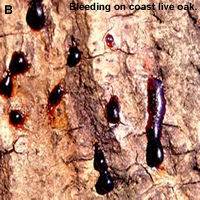Docent Circle: Field Notes Week of 2004-09-07
Cowbird Chicks Prosper By Sharing The Wealth
 Brown-headed cowbirds are born freeloaders.
They lay eggs in the nests of other birds, leaving their babes to
be raised by adoptive parents. Theory suggests these and other nest
parasites should evict any other chicks to hog all the food for
themselves. But in fact, young cowbirds live and let live. Now
researchers from the University of California, Berkeley and
Cambridge University, United Kingdom say that sometimes it pays to
share. In the study, the scientists observed cowbirds growing up in
phoebe nests. They report in the journal Science that
cowbirds raised with two phoebe chicks grew faster than cowbirds
raised with one or no adoptive siblings. The researchers theorize
that the presence of three gaping mouths spurs parent birds to work
harder than the cheeps of fewer chicks. Meanwhile, the larger and
stronger cowbird can intercept the majority of the food.
UC Berkeley Article
Brown-headed cowbirds are born freeloaders.
They lay eggs in the nests of other birds, leaving their babes to
be raised by adoptive parents. Theory suggests these and other nest
parasites should evict any other chicks to hog all the food for
themselves. But in fact, young cowbirds live and let live. Now
researchers from the University of California, Berkeley and
Cambridge University, United Kingdom say that sometimes it pays to
share. In the study, the scientists observed cowbirds growing up in
phoebe nests. They report in the journal Science that
cowbirds raised with two phoebe chicks grew faster than cowbirds
raised with one or no adoptive siblings. The researchers theorize
that the presence of three gaping mouths spurs parent birds to work
harder than the cheeps of fewer chicks. Meanwhile, the larger and
stronger cowbird can intercept the majority of the food.
UC Berkeley Article
Oak Disease Spreads Via Human Hikers
 Human hikers and mountain bikers are spreading
a disease threatening California forests. The fungus that causes
sudden oak death, Phytophthoraramorum, has killed
thousands of oak trees around the state and afflicted other native
plants such as rhododendrons and bay laurel with a leaf disease.
Previous work had found that the pathogen can be carried by hiking
boots. Now J. Hall Cushman of Sonoma State University, California,
has confirmed that forest lovers are helping to speed the trees'
demise. Cushman took soil samples from forests seemingly clear of
the disease and tested them for the fungus. He found the pathogen
frequently along trails, but not from samples taken just a few feet
off trails. Parks with the most foot, horse, and bike traffic were
more likely to have the disease than quieter parks. The findings,
which could trigger trail closures in some parks, were reported at
a meeting of the Ecological Society of America in Portland,
Oregon. The
California Oak Mortality Task Force website has more information
on the disease.
Human hikers and mountain bikers are spreading
a disease threatening California forests. The fungus that causes
sudden oak death, Phytophthoraramorum, has killed
thousands of oak trees around the state and afflicted other native
plants such as rhododendrons and bay laurel with a leaf disease.
Previous work had found that the pathogen can be carried by hiking
boots. Now J. Hall Cushman of Sonoma State University, California,
has confirmed that forest lovers are helping to speed the trees'
demise. Cushman took soil samples from forests seemingly clear of
the disease and tested them for the fungus. He found the pathogen
frequently along trails, but not from samples taken just a few feet
off trails. Parks with the most foot, horse, and bike traffic were
more likely to have the disease than quieter parks. The findings,
which could trigger trail closures in some parks, were reported at
a meeting of the Ecological Society of America in Portland,
Oregon. The
California Oak Mortality Task Force website has more information
on the disease.
Back to the Field Notes Archive
 Brown-headed cowbirds are born freeloaders.
They lay eggs in the nests of other birds, leaving their babes to
be raised by adoptive parents. Theory suggests these and other nest
parasites should evict any other chicks to hog all the food for
themselves. But in fact, young cowbirds live and let live. Now
researchers from the University of California, Berkeley and
Cambridge University, United Kingdom say that sometimes it pays to
share. In the study, the scientists observed cowbirds growing up in
phoebe nests. They report in the journal Science that
cowbirds raised with two phoebe chicks grew faster than cowbirds
raised with one or no adoptive siblings. The researchers theorize
that the presence of three gaping mouths spurs parent birds to work
harder than the cheeps of fewer chicks. Meanwhile, the larger and
stronger cowbird can intercept the majority of the food.
UC Berkeley Article
Brown-headed cowbirds are born freeloaders.
They lay eggs in the nests of other birds, leaving their babes to
be raised by adoptive parents. Theory suggests these and other nest
parasites should evict any other chicks to hog all the food for
themselves. But in fact, young cowbirds live and let live. Now
researchers from the University of California, Berkeley and
Cambridge University, United Kingdom say that sometimes it pays to
share. In the study, the scientists observed cowbirds growing up in
phoebe nests. They report in the journal Science that
cowbirds raised with two phoebe chicks grew faster than cowbirds
raised with one or no adoptive siblings. The researchers theorize
that the presence of three gaping mouths spurs parent birds to work
harder than the cheeps of fewer chicks. Meanwhile, the larger and
stronger cowbird can intercept the majority of the food.
UC Berkeley Article
 Human hikers and mountain bikers are spreading
a disease threatening California forests. The fungus that causes
sudden oak death, Phytophthoraramorum, has killed
thousands of oak trees around the state and afflicted other native
plants such as rhododendrons and bay laurel with a leaf disease.
Previous work had found that the pathogen can be carried by hiking
boots. Now J. Hall Cushman of Sonoma State University, California,
has confirmed that forest lovers are helping to speed the trees'
demise. Cushman took soil samples from forests seemingly clear of
the disease and tested them for the fungus. He found the pathogen
frequently along trails, but not from samples taken just a few feet
off trails. Parks with the most foot, horse, and bike traffic were
more likely to have the disease than quieter parks. The findings,
which could trigger trail closures in some parks, were reported at
a meeting of the Ecological Society of America in Portland,
Oregon. The
Human hikers and mountain bikers are spreading
a disease threatening California forests. The fungus that causes
sudden oak death, Phytophthoraramorum, has killed
thousands of oak trees around the state and afflicted other native
plants such as rhododendrons and bay laurel with a leaf disease.
Previous work had found that the pathogen can be carried by hiking
boots. Now J. Hall Cushman of Sonoma State University, California,
has confirmed that forest lovers are helping to speed the trees'
demise. Cushman took soil samples from forests seemingly clear of
the disease and tested them for the fungus. He found the pathogen
frequently along trails, but not from samples taken just a few feet
off trails. Parks with the most foot, horse, and bike traffic were
more likely to have the disease than quieter parks. The findings,
which could trigger trail closures in some parks, were reported at
a meeting of the Ecological Society of America in Portland,
Oregon. The